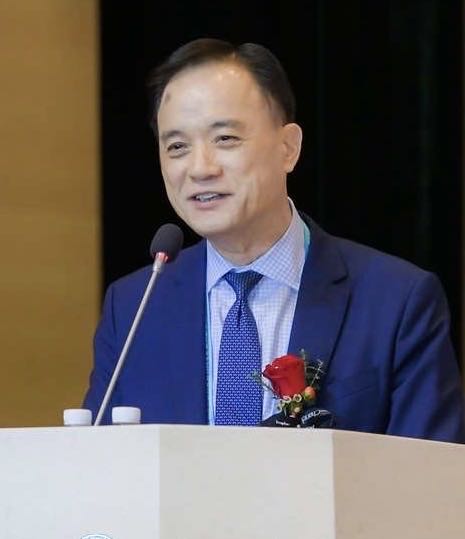
Lin Rong-Sheng, graduated from Fujian University of Chinese Medicine, chief physician, doctoral mentor, licensed acupuncturist; Vice Chair of the World Federation of Chinese Medicine Societies; Vice Chair of the World Federation of Acupuncture Societies; Chair of the Board of Directors of the American Society of Traditional Chinese Medicine; Chair of the Expert Committee of the US-China Traditional Chinese Medicine Cooperation and Exchange Center; in 2019, he was qualified as a doctoral mentor after being reviewed by the Degree Evaluation Committee of Fujian University of Traditional Chinese Medicine and peer experts, and was hired as a doctoral mentor in acupuncture. He currently serves as a member of the International Senior Technical Title Evaluation Committee, a deputy director of the professional committees of the World Federation of Chinese Medicine Associations for Orthopedics and Traumatology, Research on External Treatment Methods, Acupoint Catgut Embedding and Scalp Acupuncture; and a deputy director of the World Federation of Acupuncture Federation’s Traditional Chinese Medicine and Acupuncture Inheritance Committee; President of the American Alumni Association of Fujian University of Chinese Medicine; former president of the New York Federation of Licensed Acupuncture Practitioners; appointed as a visiting professor at the Acupuncture Training Center of the Chinese People’s Liberation Army; and an editorial board member of the magazines “World Traditional Chinese Medicine” and “Fujian Traditional Chinese Medicine”. The representative inheritor of Professor Zhang Jin, the UNESCO Intangible Cultural Heritage of Humanity and the representative inheritor of Traditional Chinese Medicine and acupuncture. He has been invited to speak on behalf of the TCM community on the global development of Traditional Chinese Medicine and acupuncture at meetings of the United Nations NGO and the World Health Organization (WHO) Executive Committee, promoting the traditional culture of Traditional Chinese Medicine and acupuncture to the world, and promoting the advantages of Traditional Chinese Medicine and acupuncture in preventing and treating diseases.
Topic:
Experience in the treatment of Long-COVID with Traditional Chinese Medicine and Acupuncture: Observation of 236 cases of acupuncture treatment of COVID-19 depression and anxiety syndrome
Abstract:
Purpose: To share experience with cases, and observe the differences in the efficacy of acupuncture in the treatment of Long-COVID depression and anxiety syndrome.
Method: The experience section focuses on Traditional Chinese Medicine and acupuncture treatment in the sequelae of COVID-19 in the respiratory, neurology, cardiovascular and cerebrovascular, psychological, genitourinary and other systems, including loss or reduction of taste and smell, shortness of breath and coughing, epilepsy, migraine, facial paralysis, tinnitus, hemiplegia, limb thrombosis, menstrual disorders, urinary incontinence, abnormal sweating, cold sensitivity and other symptoms. In the clinical observation report, 236 patients were randomly divided into an observation group (118 cases) and a traditional acupuncture group (118 cases). Both groups were treated with Gan-Shu(BL18), Yang-Jiao(GB35) and other points using reinforcing and reducing manipulations. The observation group was added to the scalp acupuncture, with the front hair cover area (behavioral and emotional area). Double needles were inserted simultaneously with manipulations given. Both groups accept treatment for three times a week with 25 minutes each session. A total of 6 weeks of treatment were given.
Results: The scores of the two groups were tested before and after treatment: (1) Hamilton (HAMD) Depression Scale; (2) Self-Rating Depression Scale (SDS); (3) Self-Rating Anxiety Scale (SAS) were significantly lower than before treatment (P<0.05). The overall evaluation of TCM disease and syndrome efficacy and the two groups of acupuncture methods were all effective. The total effective rate in the observation group was 98.3%, and the total effective rate in the control group was 72.1%. The recovery and total effectiveness of the former are significantly higher than those of the latter. ANOVA was used to statistically process P<0.05. It shows that the difference in efficacy between the two groups is statistically significant.
Conclusion: Both groups of acupuncture are effective. The observation group with scalp acupuncture is significantly better than the control group. The clinical efficacy of acupuncture in treating COVID-19 depression and anxiety syndrome is reliable, rapid, safe, and convenient.